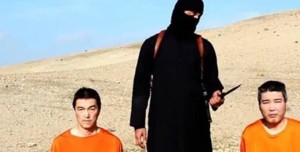
This time, Japan was the addressee. We are left to speculate regarding who is the real author of the message, and what he wants from Japan. For the eloquent executioner pronouncing certain words about retribution for Japanese involvement in Western countries’ military actions against the Islamic State is himself hardly aware of the actual content of the act the final performer of which he came to be.
Those represented by the executioner until now have had no reason to seek revenge against Japan. Tokyo maintains mutually-beneficial economic and essentially friendly political relations with almost all countries in the very volatile region of the “Greater Middle East” (GME), refraining from any interference in the events taking place there.
Speaking in parliament on 2 February, just 2 weeks after the public execution of two of his compatriots, Prime Minister Shinzō Abe stated that “there is no way for Japan to take part in air strikes, nor do we consider logistic support” to those who implement this strategy in the fight against “Islamic terrorism”.
Speaking of which, who does implement this strategy? It is the “big brother,” who in the early 1990s first expressed dissatisfaction when Japan limited its participation in the joint military action of 1991 with the “civilized countries” against Iraq to its “swollen chequebook”.
Since then much has changed, both in the nature of Japan’s position, and in the world as a whole. The world’s third economic giant is gradually building up its foreign policy muscles, step by step removing its post-war restrictions, including those related to restrictions on its use of armed forces abroad.
The current parliamentary session will include legislative landmark regarding the government’s decision of last summer to lift self-imposed restrictions, which would allow Japan to exercise the right to collective self-defence under UN charter.
There are questions about what, specifically, the results of the future law would be in terms of format, scale and high-priority areas of use of the Japanese Self-Defence Forces (SDF). Debates are ongoing, not only in Japan, but also within the US-Japanese military-political alliance. Contrary to American “advisers,” Japan clearly does not want the SDF drawn into military skirmishes in the GME.
In any case, future actions of the SDF abroad would not be of such a scale that they would threaten Japan’s image as a peaceful country. It is one of its most important foreign policy capitals, and will by no means be sacrificed on the fields of the GME, where Japan has no fight with anyone for anything. Especially on the eve of the inevitable debate regarding the question of reforming the UN Security Council, to which Japan has every chance to enter as a permanent member.
The US, in general, welcomes the activation in foreign policy of its key allies, but Washington, apparently, prefers the process not to be left unsupervised. Appropriate instruments may be used, where necessary, to reward, encourage, and in some places, to restrain this process.
In India, and especially, in South-East Asia, everything so far is going fine. Here, Japan hits China’s sore spot, which is a good thing. And further developing relations with Russia is of no purpose at all. This has to be suppressed, and independent Ukrainian idiots might be just the thing. In pursuit of the carrot dangling in front of their nose, inscribed “it’s Europe,” they brought relations with their former brother to an extreme level of tension, exposing themselves as the aggressor.
With this aggressor the “entire civilized world” must fight. And, cursing the previously unknown-to-them Ukraine, the Japanese have harnessed themselves to the cart of anti-Russian sanctions, constructed by the leaders of “world civilization.” At the same time, all projects for developing relations with Russia are suspended. It has worked.
But the bloody magic trick involving the Middle East version of useful idiots, according to the words of Shinzō Abe above, has failed. Although the demonstration on the world wide web of the two Japanese hostages took place at the worst possible time for him, that is, during his four-country tour of the GME.
The calculation, apparently, was that having relaxed during the 70 years since the war, the Japanese Samurai blood will finally start to boil; and after their sword breaks from its sheath, who will it “slice”? Who is this mysterious enemy on whose behalf these rogues of obviously “not local” origin appear on TV?
It is difficult to say whether Japan has the full information about the “producers and directors” of the recent bloody performances in the GME (and in other places), but the words of Shinzō Abe, delivered to the Japanese parliament, contained the response message: “Enough is enough, be content with Ukraine for now”.
Vladimir Terekhov, expert on the Asia-Pacific region, specially for the online magazine “New Eastern Outlook”.
